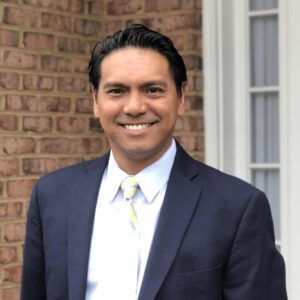My Second Chance
Find encouragement from the story of the cofounder of Filipino American Cancer Care and his fight against leukemia.

When I talk with other cancer survivors, I feel this connection, this bond. I don’t have to imagine what they are going through. I’ve lived it.
Here’s my story.
My life changed dramatically that frightening and confusing October night when I found out I had acute lymphoblastic leukemia.
I’m originally from the Philippines, but an American couple adopted me when I was in my late teens. After my undergraduate studies in Arizona, I moved to the East Coast to pursue multiple degrees. After that I started working as an executive supporting federal litigation and investigation, winning multi-million dollar contracts.
It is a very stressful job, but I loved it.
Yet alarming symptoms, including chills and stabbing pain on the left side of my body from my spleen, interrupted my life on October 21, 2015 and forced me to go to the emergency room.
After running multiple tests, the doctor finally told my wife and me the news: I had acute lymphoblastic leukemia—common for kids, but not unheard of in adults. I also had the Philadelphia plus chromosome, which would further complicate my treatment.
I remember thinking, I am only 36 years old, why did I get cancer? It was hard to let all that was happening to me sink in.
But my difficulties were only beginning.
Taking a turn for the worst
After nearly finishing the first cycle of chemotherapy, my body began rejecting it like poison. I picked up an infection and my throat began to close. They sent me to the ICU, where they intubated me, meaning they put a tube in my throat so I could breathe, and I could no longer speak.
From there, everything went downhill fast. I picked up an infection, fluid accumulated in my legs and my liver started to deteriorate, leading to a separate medical crisis: septic infection, respiratory failure and eventually cardiac arrest.
My heart literally stopped beating.
People from at least 15 countries prayed for me. The prayers were answered.
The doctors successfully resuscitated me, and my heart began to beat again.
Somehow, I survived, and I was so thankful. The day was November 5.

A long recovery
They later transferred me to another rehabilitation hospital center where my health slowly improved.
I had lost 45 pounds along with my sense of taste, smell and sight—because my eyes were swollen from a blood clot. And I could still only communicate with my right thumb.
The rehab proved rigorous, including relearning how to walk, eat, drink and speak again.
Meanwhile, the doctors warned me I needed to prepare for the next round of cancer treatment.
I was forced to lean on hope like never before.
How I found hope, strength and peace
I have always been a very hopeful person, but just being positive quickly proved insufficient. The hope I learned is rooted in the faithfulness of God.
I found Psalm 42:5 especially encouraging:
“Why, my soul, are you downcast? Why so disturbed within me? Put your hope in God, for I will yet praise him, my Savior and my God.”
Even at points in my life when everything looked bleak, because of God’s love for me, I believed that somehow better days would come.
More about my background
I also faced some difficult days growing up in the Philippines. My family was very poor, and my biological mother was forced to give me away to other family relatives when I was just 10 years old. It was a challenging reality to live with.
At my aunt’s house shortly after, I heard about God’s love through watching Billy Graham on TV. I learned that God gave his son to the earth to die for humanity, and the notion of a son being given away resonated with me.
Yet as challenging as my upbringing proved, part of my miracle would come through my family.
Finding a match
As I began to recover, the doctors from John Hopkins University told me the best approach to treat my acute lymphoblastic leukemia would require a bone marrow or stem cell transplant.
Now I faced a problem: how would I find a match?
This is a common issue that many Filipinos and immigrants face, as our genetic heritage is often underrepresented in the registry.
Doctors said my best chance would be to find one of my siblings, but they still lived in the Philippines and I hadn’t spoken to them in decades.
Fortunately, I located my biological brother through a relative, and he was willing to help me. But then we faced the logistical hurdle of bringing him to the U.S.
My wife, who used to practice immigration law, helped secure a 10-year visa for my brother, who stayed with us for three months, which proved to be a great opportunity to get to know him again and reconnect with my Filipino roots.
How my life has changed
The bone marrow or stem cell transplant proved successful, and I eventually reached remission while experiencing many severe side effects from various medications.
I continue to recover, but in many ways, I will never be the same. I used to live on very little sleep, but that has changed. Currently, I am also facing graft vs. host disease issues (GVHD) because my brother’s cells are attacking my own, a side effect of my transplant, but I’m grateful for the life I have.

Helping other Filipino cancer patients and survivors
A few years ago, I met a like-minded Filipino friend, Josie Ziman, a breast cancer survivor, and together we started Filipino American Cancer Care in February of 2020.
As I experienced firsthand, Filipinos with cancer face unique challenges, like finding donor matches or facing a lack of resources. Another issue is how the cultural concept of shame can keep some people from seeing a doctor.
Through FACC, we want to help educate and create cancer awareness through positive changes for the Filipino community. During the pandemic, we gave hundreds of masks to healthcare workers in the Philippines, and funding to 110 poor Filipino families who had been impacted by cancer.
We are just getting started.
So many people I meet are looking for hope, they are looking for a miracle. I understand this, especially because of my journey with acute lymphoblastic leukemia.
It is a joy for me to help others find hope.
God gave me a second chance. And I am thankful to live it every day.
For help with finding hope on your cancer journey, see the Pathway to Hope.
To find spiritual hope, see Knowing God Personally.
For help with prayer, see Asking God for Help.
I have a question or comment
How to find God’s hope, strength and peace

